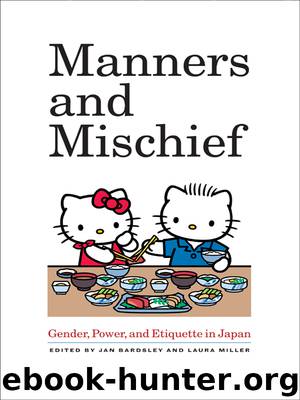Manners and Mischief by Bardsley Jan

Author:Bardsley, Jan [Bardsley, Jan; Miller, Laura]
Language: eng
Format: epub
ISBN: 978-0-520-94949-2
Publisher: University of California Press
Published: 2011-03-19T16:00:00+00:00
CHAPTER 7
The Dignified Woman Who Loves to Be “Lovable”
HIROKO HIRAKAWA
In 2005 a book advocating nationalistic sentiments entitled The Dignity of the Nation soared to the top of the charts, becoming a millionvolume seller.1 Creating a “dignity book” boom, its success prompted the publication of other volumes that featured hinkaku (dignity) in their titles. Among these subsequent dignity books, however, only one has become a best-seller: Bando Mariko’s The Dignity of the Woman (2006), a collection of how-to tips on conduct, etiquette, and philosophy that is supposed to enable readers to realize the life of a “dignified woman.”2 The Dignity of the Woman was even more successful than the original dignity book, selling so well that it caught the attention of media abroad.3 Reportedly, 80 percent of The Dignity of the Woman’s readers are women, most of them in their twenties and thirties, an audience that Bando has expressed particular interest in reaching.4 Given that few conduct books have achieved the status of a million-volume seller, the phenomenal success of The Dignity of the Woman makes it especially intriguing, leading us to ask: What is it about this book that makes it stand out from the profusion of dignity books and women’s conduct books? Why do so many women (and perhaps men as well) feel compelled to read this guidebook?
This chapter considers these questions, analyzing both The Dignity of the Woman and its reviews, primarily those posted on the Japanese site Amazon.com.jp. As I will show, the book is characterized by a peculiar gap in that, while selling exceptionally well for a conduct book, the majority of readers find it disappointing because it simply repeats the same advice readily found in the existing array of conduct manuals for women. I will argue that it is this gap between the book’s status as a million-volume seller, on the one hand, and its overwhelming unpopularity among readers, on the other, that makes this book unique, and that this fissure should be understood in the context of the collective insecurity over the fate of post-bubble Japan that the dignity book boom has successfully exploited.
The book owes its success, at least partially, to the fact that the author possesses the glamorous image of the woman who “has-it-all,” thus promising that the book will reveal the secrets that women need to know to do well in both career and family life. However, many readers experience disillusionment when they find that the book’s advice is mainly about becoming adept at pleasing men in power. Moreover, they are irritated to find that this art of “lovability” is presented as a matter of feminine virtue, rather than as a strategy for surviving discriminatory conditions. Readers are acutely and palpably frustrated that the book is blind to what many readers perceive as the reality of post-bubble Japan—that the prolonged recession seems to be making the dream of “having it all” for women increasingly beyond their reach. One can only imagine how the financial calamity of 2007 has exacerbated their sense of insecurity.
Download
This site does not store any files on its server. We only index and link to content provided by other sites. Please contact the content providers to delete copyright contents if any and email us, we'll remove relevant links or contents immediately.
The Lost Art of Good Conversation by Sakyong Mipham(2129)
How We Talk by N. J. Enfield(1959)
F You Very Much by Danny Wallace(1710)
All-In (The Gamblers Book 1) by Sarah Curtis(1515)
How To Walk In High Heels: The Girl's Guide To Everything by Morton Camilla(1349)
The Art of Communicating by Thich Nhat Hanh(1251)
Botswana--Culture Smart! by Michael Main(1239)
Men and Manners by David Coggins(1121)
The Essentials of Business Etiquette by Barbara Pachter(1086)
That's Not What I Meant! by Deborah Tannen(1084)
Secrets of the Southern Belle by Phaedra Parks(1070)
Colloquial Hindi by Bhatia Tej K(1063)
GQ How to Win at Life by Charlie Burton(973)
50 Things Every Young Gentleman Should Know (GentleManners) by John Bridges & Bryan Curtis(959)
Would It Kill You to Stop Doing That: A Modern Guide to Manners by Henry Alford(959)
The Leader Phrase Book by Alain Patrick(956)
Etiquette in Society, In Business, In Politics, and at Home by Emily Post(951)
GQ How to Win at Life: The expert guide to excelling at everything you do by Burton Charlie(945)
Treating People Well by Lea Berman & Jeremy Bernard(923)
